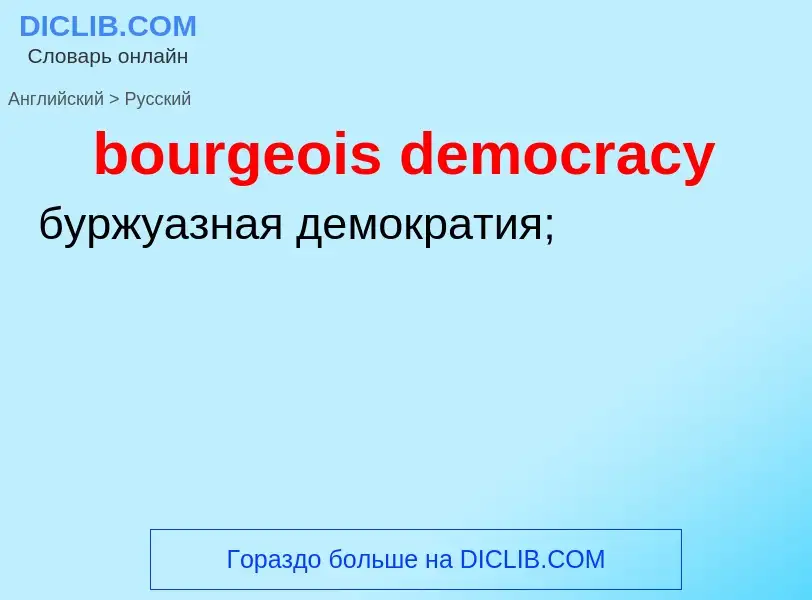Tradução e análise de palavras por inteligência artificial ChatGPT
Nesta página você pode obter uma análise detalhada de uma palavra ou frase, produzida usando a melhor tecnologia de inteligência artificial até o momento:
- como a palavra é usada
- frequência de uso
- é usado com mais frequência na fala oral ou escrita
- opções de tradução de palavras
- exemplos de uso (várias frases com tradução)
- etimologia
bourgeois democracy - tradução para russo
Definição
Wikipédia

Liberal democracy or western democracy is the combination of a liberal political ideology that operates under a representative democratic form of government. It is characterized by elections between multiple distinct political parties, a separation of powers into different branches of government, the rule of law in everyday life as part of an open society, a market economy with private property, and the equal protection of human rights, civil rights, civil liberties and political freedoms for all people. To define the system in practice, liberal democracies often draw upon a constitution, either codified or uncodified, to delineate the powers of government and enshrine the social contract. After a period of expansion in the second half of the 20th century, liberal democracy became a prevalent political system in the world.
A liberal democracy may take various and mixed constitutional forms: it may be a constitutional monarchy (Australia, Belgium, Canada, Japan, Norway, Spain and the United Kingdom) or a republic (France, India, Ireland, the United States). It may have a parliamentary system (Australia, Canada, India, Ireland, the United Kingdom), a presidential system (Indonesia, the United States), or a semi-presidential system (France).
Liberal democracies usually have universal suffrage, granting all adult citizens the right to vote regardless of ethnicity, sex, property ownership, race, age, sexuality, gender, income, social status, or religion. However, historically some countries regarded as liberal democracies have had a more limited franchise. Even today, some countries, considered to be liberal democracies, do not have truly universal suffrage. For instance, in the United Kingdom people serving long prison sentences are unable to vote, a policy which has been ruled a human rights violation by the European Court of Human Rights. A similar policy is also enacted in most of the United States. According to a study by Coppedge and Reinicke, at least 85% of democracies provided for universal suffrage. Many nations require positive identification before allowing people to vote. For example, in the United States 2/3 of states require their citizens to provide identification to vote, these states also provide state IDs for free. The decisions made through elections are made not by all of the citizens but rather by those who are members of the electorate and who choose to participate by voting.
The liberal democratic constitution defines the democratic character of the state. The purpose of a constitution is often seen as a limit on the authority of the government. Liberal democracy emphasizes the separation of powers, an independent judiciary and a system of checks and balances between branches of government. Multi-party systems with at least two persistent, viable political parties are characteristic of liberal democracies. In Europe, liberal democracies are likely to emphasize the importance of the state being a Rechtsstaat, i.e. a state that follows the principle of rule of law. Governmental authority is legitimately exercised only in accordance with written, publicly disclosed laws adopted and enforced in accordance with established procedure. Many democracies use federalism, also known as vertical separation of powers, in order to prevent abuse and increase public input by dividing governing powers between municipal, provincial and national governments (e.g. Germany, where the federal government assumes the main legislative responsibilities and the federated Länder assume many executive tasks).



![The [[Agreement of the People]] (1647), a manifesto for political change proposed by the [[Levellers]] during the [[English Civil War]], called for [[freedom of religion]], frequent convening of [[Parliament]] and equality under the law The [[Agreement of the People]] (1647), a manifesto for political change proposed by the [[Levellers]] during the [[English Civil War]], called for [[freedom of religion]], frequent convening of [[Parliament]] and equality under the law](https://commons.wikimedia.org/wiki/Special:FilePath/Agreement of the People (1647-1649).jpg?width=200)
![right to private property]] and the [[consent of the governed]]. right to private property]] and the [[consent of the governed]].](https://commons.wikimedia.org/wiki/Special:FilePath/John Locke.jpg?width=200)


